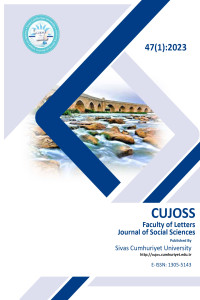Öz
Theodore Brameld, eğitimin sadece bireysel gelişim ve bilgi aktarımı olmadığını, aynı zamanda kültürel çeşitlilik, demokratik değerler ve toplumsal dönüşüm evrelerini de içeren bir süreç olduğunu savunan önemli bir eğitim filozofudur. Antropolojik bir yaklaşım benimseyerek, farklı kültürel grupların değerlerini ve inançlarını anlamaya vurgu yapmaktadır. Brameld, eğitimin demokratik değerlere vurgu yapması gerektiğini ve toplumsal adaletin, eşitliğin ve özgürlüğün eğitimde merkezi bir rol oynaması gerektiğini vurgulamaktadır. Eleştirel düşünme, yaratıcılık ve sosyal değişim fikirlerini destekleyen Brameld'in eğitim anlayışı, daha hoşgörülü, bilinçli ve etkili bir vatandaşlık anlayışını teşvik etmektedir. Brameld'in antropolojik eğitim anlayışı, eğitimde kültürel çeşitlilik, demokratik değerler ve toplumsal dönüşüm konularında önemli bir katkı sunmaktadır ve eğitim politikalarının ve uygulamalarının bu değerlere dayalı olarak şekillenmesini desteklemektedir.
Anahtar Kelimeler
Theodore Brameld Antropolojik Eğitim Kültürel Çeşitlilik Demokratik Değerler Toplumsal Dönüşüm Eleştirel Düşünme Yaratıcılık Eğitim Felsefesi.
Kaynakça
- Anderson-Levitt, K. M. (2012). Anthropologies of education: A global guide to ethnographic studies of learning and schooling. Berghahn Books.
- Brameld, T. (1950). Patterns of Educational Philosophy: Divergence and Convergence in Culturological Perspective. New York: Holt, Rinehart and Winston.
- Brameld, T. (1957). Patterns of Educational Philosophy: Divergence and Convergence in Culturological Perspective. New York: Holt, Rinehart and Winston.
- Brameld, T. (1965). Education as Power: A Marxist Interpretation. Boston: Porter Sargent.
- Brameld, T. (1969). The Uses of Philosophy in Education. Boston: Porter Sargent.
- Brameld, T. (1971). Japonya: İki Toplumda Kültür, Eğitim ve Değişim. New York: Holt, Rinehart ve Winston. Brameld, T. (1971). Kültürel Açıdan Eğitim Felsefeleri. Harvard Eğitim İncelemesi, 41(1), 1-24.
- Brameld, T. (1974). The Floodwood School: A Community of Learners. New York: Teachers College Press.
- Brameld, T. (1977). The Intellectuals and the Schools: A Study in Philosophical Analysis. Boston: Porter Sargent.
- Brameld, T. (1981). Crisis in Education: The Sociological Interpretation. New York: Teachers College Press.
- Candea, M. (2019). The Social after Gabriel Tarde: Debates and Assessments. New York: Routledge.
- Fisher, R. M. (2014). Teaching Critics: How to Discuss Students’ Work in Ways That Promote Learning. San Francisco: Jossey-Bass.
- Durkheim, E. (1977). Education and sociology. Free Press.
- Geertz, C. (1973). The interpretation of cultures: Selected essays. Basic books.
- Heath, S. B., & McLaughlin, M. W. (1993). Identity and Inner-City Youth: Beyond Ethnicity and Gender. Teachers College Press.
- Heath, S. B. (2012). What can anthropology contribute to educational policy? Anthropology & Education Quarterly, 43(1), 86-98.
- Lave, J., & Wenger, E. (1991). Situated Learning: Legitimate Peripheral Participation. Cambridge University Press.
- Moll, L. C., Amanti, C., Neff, D., & González, N. (1992). Funds of Knowledge for Teaching: Using a Qualitative Approach to Connect Homes and Classrooms. Theory into Practice, 31(2), 132-141.
- Spindler, G. D. (Ed.). (1987). Education and Cultural Process: Anthropological Approaches. Waveland Press. Stambach, A. (2017). Anthropology of Education. Oxford Bibliographies.
- Werner, O., & David, J. L. (2017). Educational Ethnography: Perspectives from the Field. Springer.
- Willis, P. E. (1981). Learning to Labor: How Working Class Kids Get Working Class Jobs. Columbia University Press.
Ayrıntılar
| Birincil Dil | Türkçe |
|---|---|
| Konular | Aile Sosyolojisi |
| Bölüm | Araştırma Makalesi |
| Yazarlar | |
| Yayımlanma Tarihi | 30 Haziran 2023 |
| Yayımlandığı Sayı | Yıl 2023 Cilt: 47 Sayı: 1 |

Bu eser Creative Commons Atıf-GayriTicari 4.0 Uluslararası Lisansı ile lisanslanmıştır.

